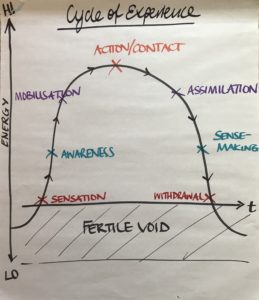The cycle of experience
In 1947, Fritz Perls began to shape an idea that became the Gestalt Cycle of Experience. It was built upon by successive Gestalt thinkers including the Polsters and Joseph Zinker at the Gestalt Institute of Cleveland. They were trying to describe something fundamental to growth and development, namely how organisms (including us humans) get what we need from our environment, how we self-regulate. What resulted was a model, a map that can orientate any individual or group trying to live well. What resulted was the Gestalt Cycle of Experience. It is an overarching framework that can help us understand where we are in a process of knowing and getting what we need to thrive.
It goes a little bit like this:
- Nothingness, void, rest
- Then, a stimulus, a sensation, something piques our interest
- Then comes an awareness of what we need
- Our energy rises and we mobilise towards what we need
- We make contact with what we need
- We savour the need being met and perhaps make sense of what just happened
- Then we withdraw and return to rest, void, nothingness – a place out of which something new can emerge.
Try running through that process with the example of getting up from your desk for a cup of tea or a pee. It’s pretty simple. But it also works for bigger, longer term things – finding your niche in the world of work, working out who you want to hang out with, finding a life partner.
Best drawn as a sine wave showing how energy rises and recedes, this has become a fundamental model for helping us understand how we thrive but also how we get interrupted along the way.
The cycle of experience teaches us that we are always somewhere in a process; that there are beginnings, middles and endings. We can learn to be more aware of how our energy rises and falls in relation to our context. We can notice which parts of the cycle we skip over or don’t give sufficient attention. We can trust that voids can be fertile; that we need fallow times of low energy out of which something new will grow. And we can spot where others are in their cycles of experience in order to join them and support their process of thriving.

